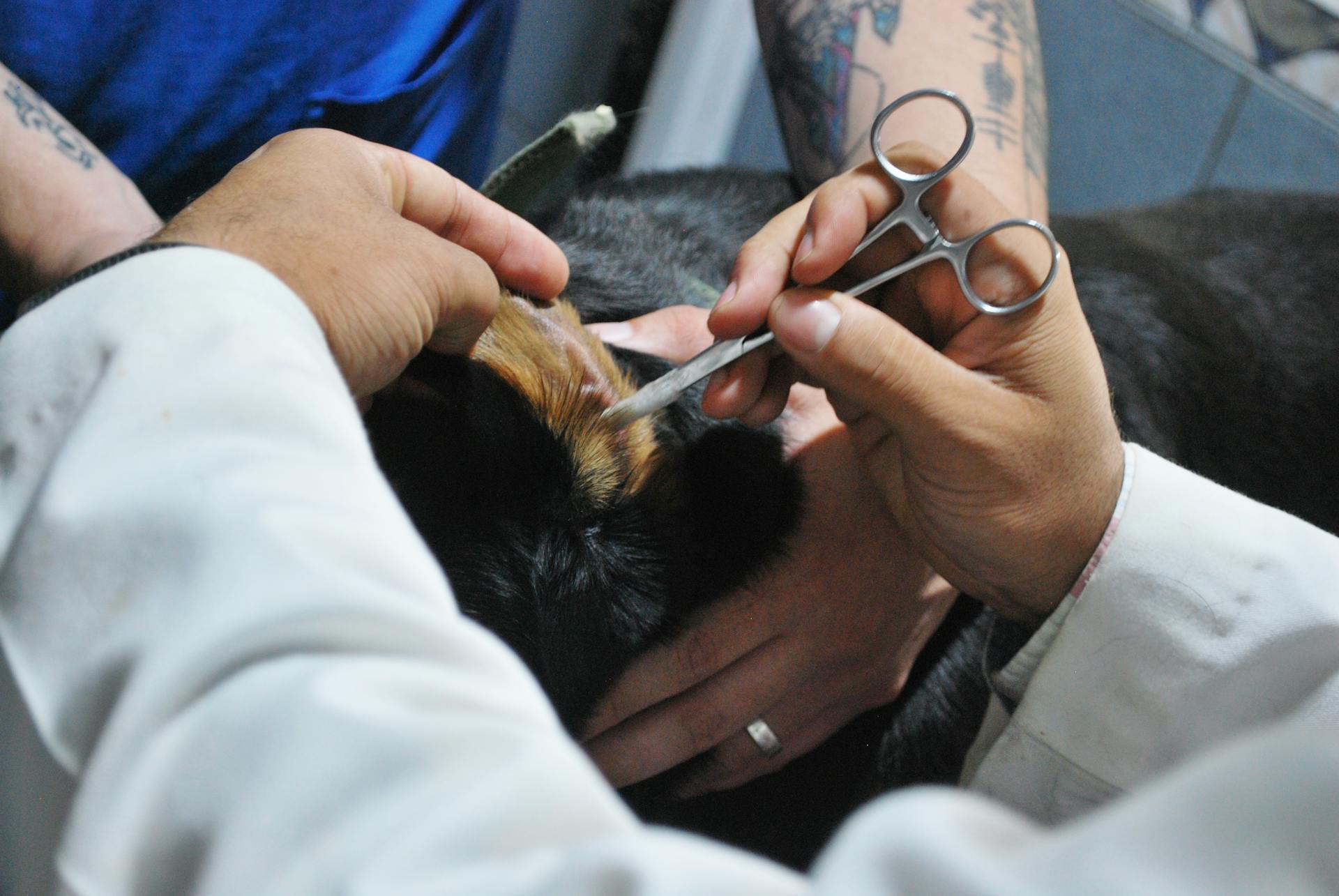
Pancreatitis in dogs can be a serious condition, but the good news is that with proper treatment, most dogs can make a full recovery.
The duration of pancreatitis in dogs can vary greatly, but it's often acute, lasting anywhere from a few days to a week.
The recovery time for dogs with pancreatitis depends on the severity of the condition and the dog's overall health.
In mild cases, dogs may start feeling better within 24 to 48 hours, while more severe cases can take several weeks to recover from.
Causes and Diagnosis
Pancreatitis in dogs can be caused by a variety of factors, including genetics, obesity, and certain medications.
The most common cause of pancreatitis in dogs is a blockage of the pancreatic duct, which can be caused by a gallstone or other debris.
Inflammation of the pancreas can also be triggered by a high-fat diet, which can cause the pancreas to become overworked and inflamed.
Diagnosing pancreatitis in dogs often involves a combination of physical examination, laboratory tests, and imaging studies.
Blood tests can help identify elevated levels of pancreatic enzymes, which are often present in dogs with pancreatitis.
Causes of Canine Pancreatitis
Canine pancreatitis can be a serious condition, and understanding its causes is crucial for prevention and treatment. A high-fat diet is a common culprit, so it's essential to monitor your dog's eating habits.
Eating fatty foods can trigger pancreatitis, which is why it's not a good idea to leave trash or fatty treats within reach of your dog.
Some dogs are more prone to pancreatitis due to genetic predisposition. This means that certain breeds or family lines may be more susceptible to the condition.
Dietary indiscretion can also contribute to pancreatitis. This includes eating foods that are not part of your dog's regular diet, such as table scraps or spoiled food.
Here are some common causes of canine pancreatitis:
- A diet high in fat
- Dietary indiscretion
- Hormonal disorders
- Diabetes
- Medications
- Genetic predisposition
Diagnosing Pancreatitis in Dogs
Diagnosing pancreatitis in dogs can be a bit tricky, but veterinarians use some pretty cool tools to get to the bottom of it. One way they diagnose pancreatitis is through a blood test called the SPEC cPL test.
For more insights, see: Test for Pancreatitis in Dogs
The SPEC cPL test detects 83 percent of pancreatitis cases in dogs and excludes other possible diseases in 98 percent of cases, which is pretty impressive. It's run overnight by a reference lab, so you don't have to wait around for the results.
Another tool veterinarians use is ultrasound, which not only detects 68 percent of pancreatitis cases but also gives them a chance to look at other organs. This is especially important if pancreatitis is accompanied by a tumor near the pancreas.
The in-hospital pancreatic test is not my favorite, as it can also be affected by other disease processes, such as liver or gastrointestinal disease, which can cause an abnormal result.
Explore further: Pancreatitis in Dogs Not Eating
Symptoms and Signs
Dogs with pancreatitis may exhibit symptoms such as vomiting, diarrhea, and abdominal pain.
Their appetite may be decreased, and they may become lethargic or depressed.
Pancreatitis can also cause a dog's abdomen to be swollen or tender to the touch.
Some dogs may show signs of shock, such as pale gums and a rapid heartbeat.
Their temperature may be elevated, and they may have a fever.
In severe cases, pancreatitis can lead to a life-threatening condition known as hemorrhagic gastroenteritis.
The severity and duration of pancreatitis symptoms can vary depending on the underlying cause and the dog's overall health.
Recovery and Treatment
Recovery from pancreatitis in dogs can vary depending on the severity of the case. For mild cases, you can expect a full recovery within a few days to a week of seeking veterinary treatment.
In more severe cases, hospitalization may last up to 2 weeks. Your dog will need to be closely monitored and receive aggressive treatment during this time.
After hospitalization, your dog will need to continue with a recovery period that can last up to 2 weeks. This involves following a diet of low-fat food and taking medications as prescribed by your veterinarian.
Here's a brief overview of the recovery timeline:
A Dog for Recovery

Most mild cases of pancreatitis in dogs will resolve within a few days of seeking veterinary treatment.
The recovery time for pancreatitis is variable depending on how severe a case your dog has. For milder pancreatitis cases, your dog will need to be hospitalized for aggressive treatment for 2-4 days.
For dogs with mild pancreatitis, a full recovery can take anywhere from 1 to 2 weeks. This means your dog will need plenty of rest, a special diet, and regular check-ups with your vet.
Dogs with severe pancreatitis usually require more extensive treatment and hospitalization that can last for several days or even weeks. The treatment might include pain-control measures, intensive intravenous fluid and electrolyte support, and stomach-protectant medications.
The cost of treating severe pancreatitis can be estimated at about $2000-5000, but can go much higher if your dog requires long-term hospitalization.
Here's a rough estimate of what you can expect during your dog's recovery:
Keep in mind that every dog is different, and the recovery time will depend on the severity of the case. With proper treatment and care, most dogs can make a full recovery from pancreatitis.
How to Treat Pancreatitis
So, you've been diagnosed with pancreatitis. First and foremost, it's essential to stay hydrated by drinking plenty of fluids, especially water, as mentioned in the "Symptoms and Diagnosis" section. This will help your body recover from the inflammation and reduce the risk of complications.
Pain management is also crucial, and you can take over-the-counter pain relievers like acetaminophen or ibuprofen as directed, but be sure to follow the recommended dosage to avoid exacerbating the condition.
Rest is vital, so get plenty of sleep and avoid strenuous activities, as advised in the "Causes and Risk Factors" section. This will help your pancreas recover and reduce the risk of further inflammation.
Your doctor may also prescribe medication to manage your symptoms and prevent further complications, such as antibiotics or anti-inflammatory medications.
Here's an interesting read: Pain Relief for Pancreatitis in Dogs
What's the Outlook?
For most dogs, the outlook is positive with proper treatment.
Milder cases of pancreatitis can resolve within a few days of seeking veterinary treatment.
For your interest: Pancreatitis Dogs Treatment Home
In fact, your dog can leave the hospital after just 2 to 4 days, and be fully recovered within 1 to 2 weeks.
However, more severe cases can take longer to recover from, with hospitalisation lasting up to 2 weeks.
In these cases, you can expect an even longer recovery period, which can last up to a week or more after hospitalisation.
Frequently Asked Questions
How do you comfort a dog with pancreatitis?
Provide a quiet and comfortable space for your dog to rest, minimizing loud noises and disruptions during their recovery. This helps reduce stress and discomfort for your dog with pancreatitis.
Sources
- https://www.smalldoorvet.com/learning-center/medical/pancreatitis-in-dogs/
- https://www.purina.co.nz/articles/dogs/senior/health/pancreatitis-in-dogs
- https://www.thewildest.com/dog-health/treating-pancreatitis-dogs
- https://www.alphapaw.com/expert-advice/dog-diseases/pancreatitis-in-dogs-symptoms-treatment/
- https://www.pawlicy.com/blog/pancreatitis-in-dogs/
Featured Images: pexels.com


